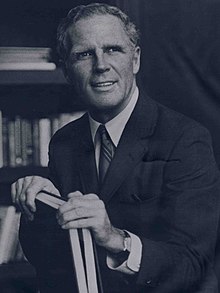Kevin White | |
|---|---|
 White circa 1975 | |
| Mayor of Boston | |
| In office January 1, 1968 – January 2, 1984 | |
| Preceded by | John F. Collins |
| Succeeded by | Raymond Flynn |
| 23rd Secretary of the Commonwealth of Massachusetts | |
| In office January 5, 1961 – December 20, 1967 | |
| Governor | John Volpe Endicott Peabody John Volpe |
| Preceded by | Joseph D. Ward |
| Succeeded by | John Davoren |
| Personal details | |
| Born | Kevin Hagan White September 25, 1929 Boston, Massachusetts, U.S. |
| Died | January 27, 2012 (aged 82) Boston, Massachusetts, U.S. |
| Political party | Democratic |
| Spouse |
Kathryn Galvin (m. 1956) |
| Parent |
|
| Relatives | Henry E. Hagan (grandfather) William J. Galvin (father-in-law) |
| Education | Williams College (AB) Boston College (LLB) Harvard University |
Kevin Hagan White (September 25, 1929 – January 27, 2012) was an American politician best known for serving as the mayor of Boston for four terms from 1968 to 1984. He was first elected to the office at the age of 38.[1][2] He presided as mayor during racially turbulent years in the late 1960s and 1970s, and the start of desegregation of schools via court-ordered busing of school children in Boston. White won the mayoral office in the 1967 general election in a hard-fought campaign opposing the anti-busing and anti-desegregation Boston School Committee member Louise Day Hicks. Earlier he had been elected Massachusetts Secretary of the Commonwealth in 1960 at the age of 31, and he resigned from that office after his election as Mayor.
White was credited with revitalizing the waterfront, downtown and financial districts of Boston, and transforming Quincy Market into a metropolitan and tourist destination. In his first term, he implemented local neighborhood "Little City Halls" but ended them after narrowly winning the 1975 election during the Boston school desegregation busing crisis and subsequently constructed a classic and centralized city political machine. He was unsuccessful in his efforts to obtain higher office (Governor of Massachusetts and Vice President of the United States).
His mayoral administration was subject to decades-long federal investigations into corruption, which led to the conviction of more than 20 city hall employees and nearly as many businessmen; the investigations were influential in leading White to decline to seek reelection in 1983, allowing him to avoid public debate and criticism by other mayoral candidates on the topic. He himself was never indicted for wrongdoing.
- ^ "'New Inaugural' in Traditional Boston Setting Today". The Boston Globe. January 1, 1968. p. 3. Retrieved March 17, 2018 – via pqarchiver.com.
- ^ "FLYNN INAUGURAL TO SET SOME FIRSTS". The Boston Globe. January 2, 1984. p. 1. Retrieved March 17, 2018 – via pqarchiver.com.